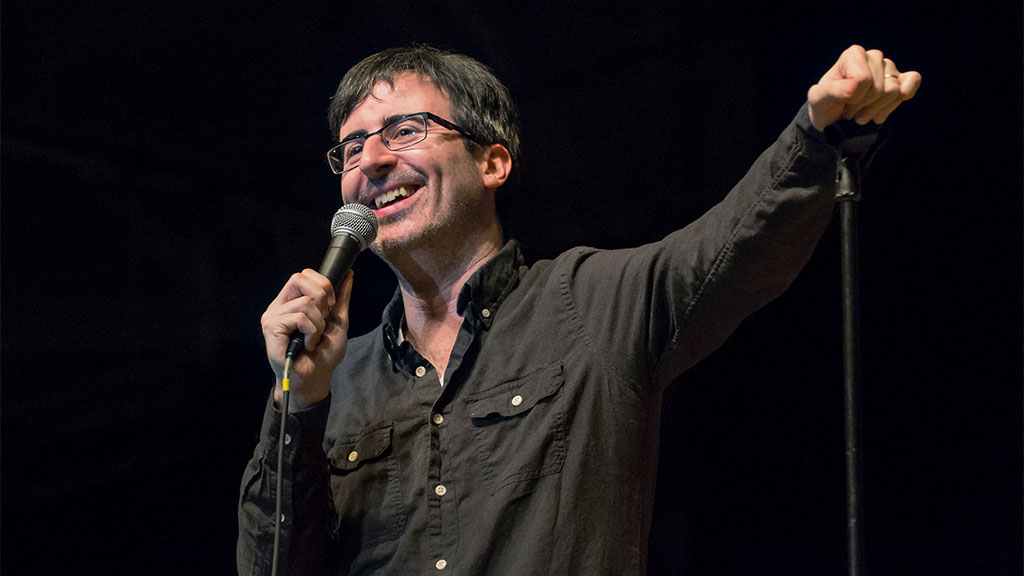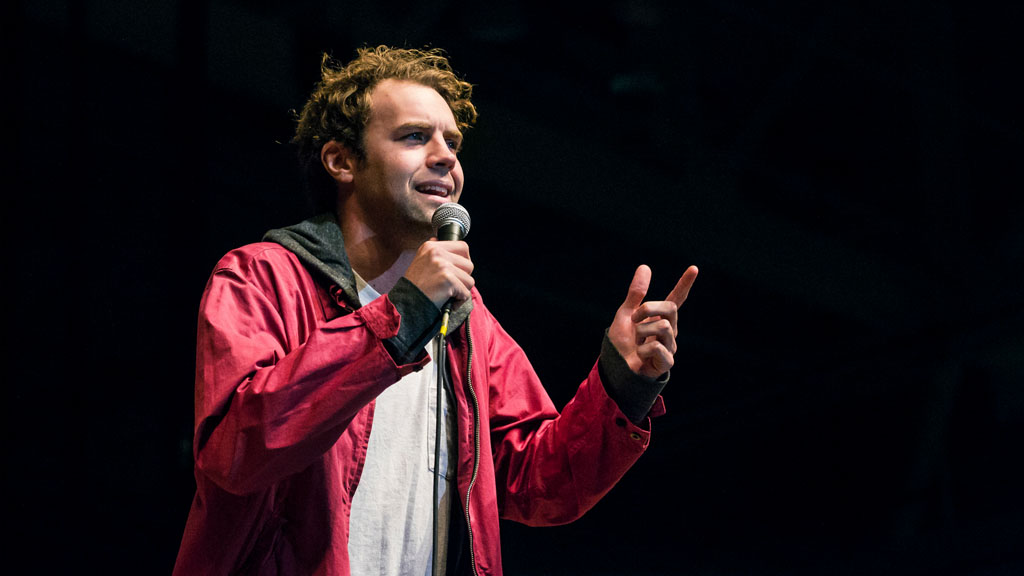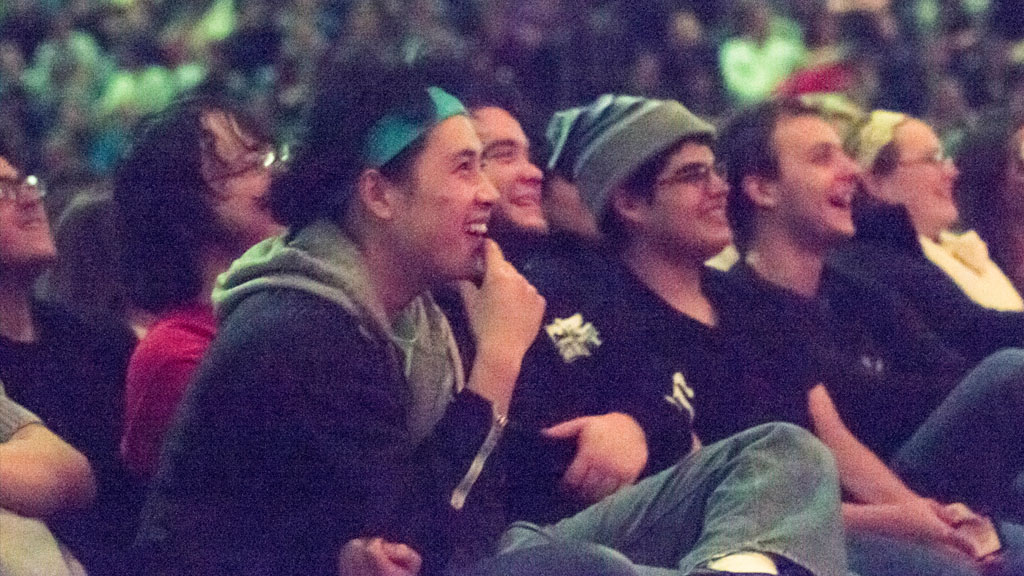As a fan of “The Daily Show,” I have seen John Oliver’s work before. I watched his skits and appreciated his sense of humor, and honestly, I worried that his live show at Freeze Fest would be no different. But instead, I was met with something new as a type of brief but comfortable friendship formed. The audience became Rochester, the nerdy, overeager college kids with many faults. And John Oliver became the dude who made us acknowledge and laugh at them.
Students crowded in long lines in order to enter the Gordon Field House on that windy Saturday night. The seating was nearly filled but had just enough empty seats to leave a buffer spot between each group of friends. Once most people had found their niche, the first act began.
Brooks Wheelan, cast member on Saturday Night Live (SNL), opened the show. He started with the classic interpreter jokes, watching as they signed “Fuck” five to ten times. Then, Wheelan went on to yet another cliché: the weather. Once the obvious was taken care of, he moved onto the main theme of his act which was literally making fun of himself for being what he called the worst cast member on SNL.
In order to fully express this idea, he read off many rejected SNL skit ideas that he had come up with. These ranged from advice from a guy with a mesh tank top to the Olympic diver who doesn’t know how to swim to a fire marshal visiting the Keebler Elf tree. The ideas were all received with weak laughter from the audience, many members of which were taking the time to move around and purchase snacks from the concession stand. Someone sitting behind me stated what was fairly clear: “This is actually pretty bad.”
The act did get better when Wheelan started telling stories about his life. He even received a decent amount of applause with an unintended crowd pleaser when he told the audience about his degree in biomedical engineering. But in the end, he summed up his own act better than anyone else: “What I’m saying is it’s not that difficult to get on SNL.”
With an abrupt end, it was time to move onto the main show and the crowd was more than ready. John Oliver ran onto the stage, curtsied and waited for the long round of applause to subside. The comedian was finally here.
Oliver started with another weather joke but at least he mentioned a future of fighting off the polar bears who are sure to be attracted to our deathly cold winds. Later, he moved on to jokes about politicians, Australia, Britain and the United States as a whole. He made comments about politics and racism in a way that encouraged laughter as well as a touch of reflection.
Like “The Daily Show,” this performance included a measure of socially conscious comedy. But as time went on, the jokes evolved to something that required more self-consciousness as Oliver tried to encourage the audience to reflect on what legacy we, as U.S. citizens, want our country to leave behind.
The audience quickly showed Oliver that he was not at a philosophical liberal arts school, but instead at a nerd filled school overly focused on innovation. And this time for reflection quickly devolved into a brain storming session.
For instance, when we were rhetorically asked about Britain’s legacy which Oliver found to be quite substandard, the audience took this as the perfect time for a pep talk. Students began shouting out the good qualities and contributions of Oliver’s home country. It started with tea —which he quickly reminded us was not original to Britain — Followed by Robin Hood, Winnie the Pooh and even Harry Potter. And although these things are unarguably wonderful, Oliver quickly reminded us that they were all fictional as well.
In another attempt at reflection, Oliver asked what we remember about Egypt. The first answer he heard from one very representative member of the audience, was “cats.” Everyone, including Oliver, laughed for a good minute. He even wiped away tears of what seemed to be a combination of laughter and shame.
Pyramids: that was the answer he was looking for in order to continue his comedy set. Instead, we gave him a tangent of cat jokes that lasted far longer than Oliver could have predicted. He even asked, “Has the wind blown the logic from your minds, Rochester?”
At this point, a bond between the audience and Oliver was formed. We seemed to know each other. We, Rochester, were not afraid to tell him who we really were. And Oliver wasn’t afraid to tell us how bad that was. In the jokes that followed, we gave him even more reason to shake his head, especially when the topic turned to pointless American innovation: our specialty.
Oliver told us of massive t-shirt cannons, burrito parachutes and other American inventions that had little to no purpose. This included mention of an inflatable batting cage set up on the USS Yorktown aircraft carrier and how the base balls hit off the carrier were readily caught and retrieved by people riding jet skis. This, being one of the most American inventions Oliver could think of, lead to a rendition of the American Anthem with lyrics replaced to describing the event. RIT’s audience, moved by the beauty of his voice and the idea itself, roared with applause and rose in a standing ovation.
By the end of the night Oliver and Rochester had agreed on the definition of an ideal American: a man who rode a jet ski during Hurricane Sandy, only to take a picture of himself on it in front of the Statue of Liberty with a camera on a stick. With that, the show ended, the audience cleared out and everyone left feeling a bit more understood.
photos by Joyce Kasab










